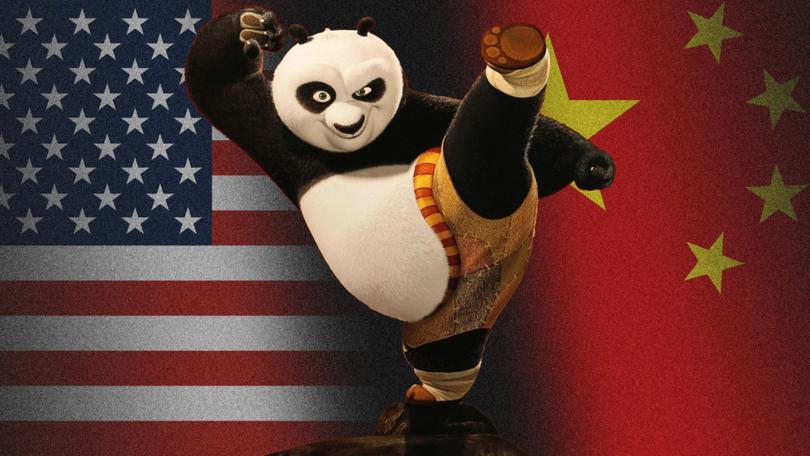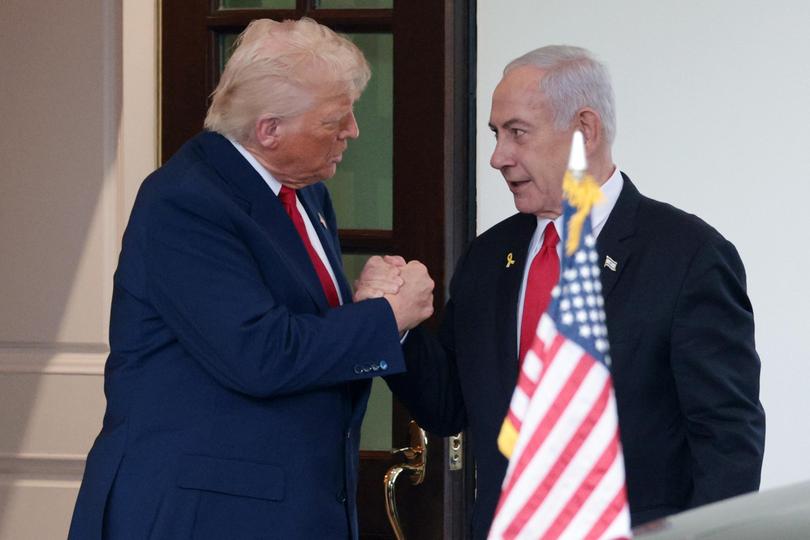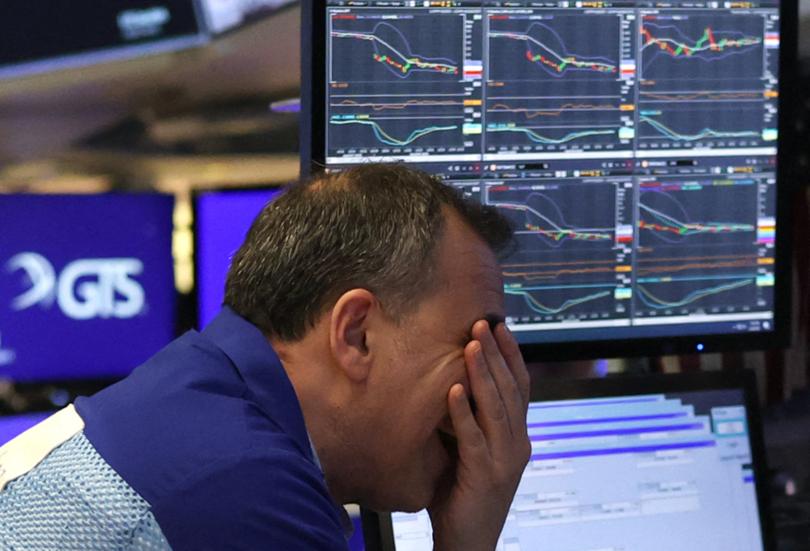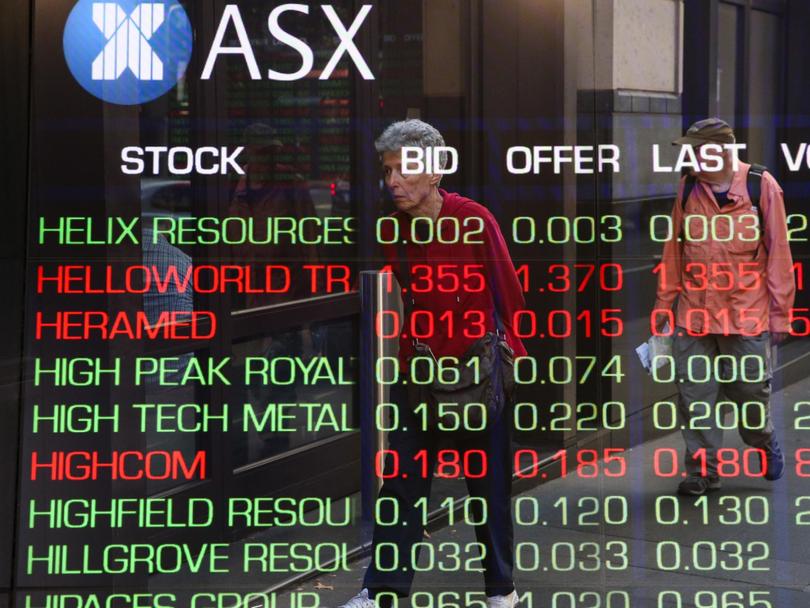World trade war escalates as China vows to ‘fight to the end’ after Trump threatens extra 50 per cent levy
President Donald Trump’s threat to double down on China triggered an angry response, although Europe made a peace offering.

President Donald Trump said he would impose an extra 50 per cent tariff on imports from China from Wednesday if the world’s second-largest economy does not withdraw a 34 per cent retaliatory levy scheduled to begin the following day.
After receiving the threat, the Chinese government promised to double down, escalating a trade war that could trigger a global recession.
“The US threat to escalate tariffs on China is a mistake on top of a mistake, which once again exposes the US’s blackmail nature,” the Chinese commerce ministry said. “If the US insists on its own way, China will fight to the end.”
Sign up to The Nightly's newsletters.
Get the first look at the digital newspaper, curated daily stories and breaking headlines delivered to your inbox.
By continuing you agree to our Terms and Privacy Policy.Mr Trump threatened to terminate “all talks with China” on trade, as he left the world uncertain as to whether he is open to negotiations over the tariffs that have upended the global trade system built over decades over World War II.
Many of America’s other big trading partners took a more conciliatory approach than the Chinese, American’s main military rival. The European Union trading bloc, which has delayed retaliatory tariffs twice, said it had offered the US “zero-for-zero” tariffs on industrial goods.
Israeli Prime Minister Benjamin Netanyahu, visiting Mr Trump in Washington, said he wanted to erase America’s $10 billion trade deficit with Israel, which sells the US chemicals, fuels, robotics and electronic components.
“We intend to do it very quickly,” Mr Netanyahu said. “I think Israel can serve as a model for other countries who ought to do the same.”

Open to deals?
Whether Mr Trump’s tariffs are intended as permanent protection for American manufacturing jobs and agriculture, or are negotiating tactic designed to restructure the global trading system, is unclear. Even members of the president’s administration may not know.
Mr Trump’s trade adviser, Peter Navarro, wrote in the Financial Times on Monday “this is not a negotiation”. Earlier, Treasury Secretary Scott Bessent wrote on X that the administration would “open negotiations” with Japan.
Almost 70 countries have approached the US seeking trade deals Mr Trump, Mr Bessent said.
Asked on Monday if the tariffs were permanent or negotiable, Mr Trump said: “They can both be true.”
Fake news
The sensitivity of share prices to the trade war was demonstrated when US television network CNBC reported Mr Trump was considering a 90-day tariff pause. The incorrect report added about $3 trillion to the value of US stocks Monday, although the gain was reversed when the mistake became clear.
Despite predictions of a Black Monday, the US share market fell less than 1 per cent. On Tuesday in Australia, the share market rose 2 per cent after Monday’s 4 per cent, $100-billion loss.
Shares across Asia rose too, led by a 6 per cent rally in Japan, which the administration said was likely to be prioritised in any negotiations. Even China’s main index, the Shanghai Composite, rose a little Tuesday after falling 7 per cent Monday. Futures markets predicted US stocks would rise Tuesday.

“I suspect the last few days of US panic selling has been overdone,” said Scott Phillips, the chief investment officer of Motley Fool Australia, a share advice service.
Among the Australian gainers was Sydney-based Zip, a consumer credit business, which rose 5 per cent after deciding to purchase $50 million of its shares, a step taken by companies which believe their stock is undervalued.
The best-performing large stock was Whitehaven Coal, which rose 9 per cent.
Economic consequences
The tariffs’ direct economic effect on Australia are likely to be modest, according to the Federal Treasury, but the second-order consequences of a global trade war are hard to predict.
Many economists believe they will trigger an influx of Chinese cars, electronics and other goods previously destined for the US, putting downward pressure on inflation. This will lead the Reserve Bank of Australia to cut interest rates, they say, starting with quarter of a percentage point in May, or maybe more.
One measure of consumer sentiment - how Australians feel about the economy - reported its biggest monthly fall in almost two years.
Asked if Australia was heading into recession, Liberal leader Peter Dutton said: “It is under Labor.”
The benchmark S&P/ASX 200 index has fallen 9 per cent this year. A similar increase would be considered a strong return in one year.
AMP’s chief economist Shane Oliver said shares are “still not cheap” despite falls over the past week. “Given the now even-bigger threat to growth flowing from Trump’s latest round of tariffs, it looks like they will have a further leg down,” he wrote this week.

The dollar is close to its lowest value against the US dollar in five years, making travel to American more expensive. One-stop flights from Sydney to New York start at $2700, according to Google.
In the US, even some of Mr Trump’s allies are questioning his trade policies, including Texas senator Ted Cruz, JPMorgan Chase chief executive Jamie Dimon and conservative podcaster Ben Shapiro.
Elon Musk, the world’s richest man, said the US and Europe should establish a free-trade zone. In response to a video of Mr Narvarro, the trade adviser advocating tariffs, Mr Musk said: “he ain’t built shit.”

